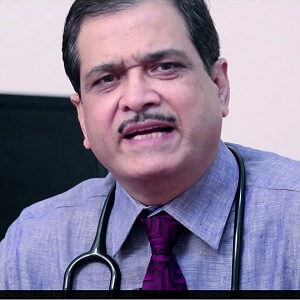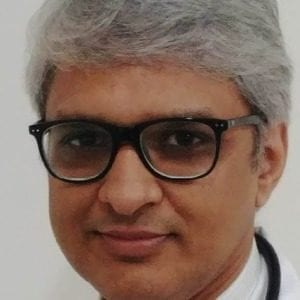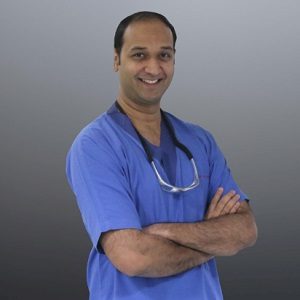Best ECMO Doctors in India
- Top Interventional Cardiologist | Apollo Hospital, New Delhi, India
- 26+ Years Experience
- Indraprastha Apollo Hospital, New Delhi
Profile Highlights:
- Dr. Rajeev Kumar Rajput is one of the best Cardiologists in India with nearly 23 years of experience. He is a clinical cardiologist engaged in diagnosing and treating cardiovascular diseases.
- Dr. Rajput is currently working as a senior consultant with Indraprastha Apollo Hospitals, New Delhi, and also offers patient care at the Heart & Gynae Clinic.
- Dr. Rajeev Kumar Rajput specializes in Angiography and Interventional Cardiology. The treatments provided involve Neonatal and Infant cardiac surgeries, Device Closure, and Valve replacement. He has expertise in Aortic Aneurysm Surgery, Vascular Surgery, Percutaneous Coronary Interventions, Endovascular Repair, Cardiac Catheterisation, Open Heart Surgery, and MV replacement.
- Dr. Rajput is credited with publishing several papers in noted medical journals.
- Cardiologist, Gurugram, India
- Over 20 years’ experience
Profile Highlights:
- Dr. Vivek Chaturvedi is a highly experienced and acclaimed cardiologist with over 20 years of experience.
- He has performed more than 2500 cardiac ablations, several of them for complex arrhythmias like atrial tachycardia, ventricular tachycardia, VPC, and atrial fibrillation using the latest technology like 3D Electroanatomic mapping.
- He has more than 50 publications in international journals & books.
- Interventional Cardiologist, Chennai, India
- Over 15 years’ experience
- Apollo Hospitals Greams Road
Profile Highlights:
- Dr. Sai Satish is a distinguished Senior Interventional Cardiologist affiliated with Apollo Hospitals in India, renowned for his pioneering contributions to the field of transcatheter valve therapies.
- His expertise extends internationally, as he also serves as a practicing interventional cardiologist and esteemed faculty member at the Gottsegen Institute of Cardiology in Budapest, Hungary, one of the world’s leading centers for TAVR (transcatheter aortic valve replacement) training.
- A trailblazer in the realm of minimally invasive cardiovascular procedures, Dr. Satish is celebrated for performing the highest number of percutaneous edge-to-edge mitral repairs (MitraClip implants) in the Indian subcontinent.
Best ECMO Hospitals in India
- City: New Delhi, India
Hospital Highlights:
- Over the last 33 years, the Fortis Escorts Heart Institute has set new standards in cardiac treatment with groundbreaking research. It is now known around the world as a centre of expertise for Cardiac Bypass Surgery, Interventional Cardiology, Non-invasive Cardiology, Paediatric Cardiology, and Paediatric Cardiac Surgery.
- The hospital has cutting-edge laboratories that perform a wide range of diagnostic tests in Nuclear Medicine, Radiology, Biochemistry, Haematology, Transfusion Medicine, and Microbiology.
- Fortis Escorts Heart Institute boasts a diverse group of bright and experienced doctors who are backed up by a team of highly qualified, experienced, and devoted support professionals as well as cutting-edge equipment such as the recently installed Dual CT Scan.
- Approximately 200 cardiac doctors and 1600 personnel currently collaborate to manage over 14,500 admissions and 7,200 emergency situations each year. The hospital now has a 310-bed infrastructure, as well as five cath labs and a slew of other world-class amenities.
- City: Faridabad
Hospital Highlights:
In the sprawling city of Faridabad, where healthcare needs are diverse and ever-evolving, one institution has consistently stood out as a beacon of excellence in the field of medicine—Marengo Asia Hospital. Established with a vision to provide world-class healthcare services to the community it serves, Marengo Asia Hospital has emerged as a trusted name synonymous with quality, compassion, and innovation in healthcare.
- City: New Delhi, India
Hospital Highlights:
- Equipped with 650 beds, BLK-Max Super Speciality Hospital is the largest stand-alone private sector hospital in Delhi.
- With over 1500 healthcare providers and 150 globally renowned super specialists, the hospital is one of Asia’s largest BMT Centres. The hospital is known for having some of the best cancer doctors in the country.
- The hospital is NABH and NABL accredited and was inaugurated by the first Prime Minister of India. Pt. Jawahar Lal Nehru.
- City: Chennai, India
Hospital Highlights:
- Located in Chennai, India, MGM Healthcare is a top multispecialty hospital that provides all medical services under one roof.
- Since its founding in 2019, MGM Healthcare has quickly become a leading national referral centre, creating several innovative flagship initiatives.
- MGM Healthcare combines next-generation medical and digital technologies to provide better patient results.
- With 12 centres of excellence, more than 400 inpatient beds, 100 intensive care unit beds, and 24/7 emergency care, MGM Healthcare leaves no chance in redefining the patient experience in Chennai.
- MGM Healthcare boasts 250+ expert doctors across 30+ departments, including Cardiology, Pulmonology, Neurology, Obstetrics & Gynaecology, and more.
- They house 12 specialized Centres of Excellence, including Neurosciences, Orthopaedics, and Multi-Organ Transplantation.
- Their team of doctors, nurses, and paramedics works together to give every patient individualized treatment.
- City: Noida, India
Hospital Highlights:
- Fortis Hospital, Noida, stands as one of the oldest and most trusted healthcare institutions in the region, setting a benchmark for comprehensive medical care.
- As the second mega hub hospital in the Fortis Healthcare Group, Fortis Hospital, Noida, upholds a legacy of trust among more than 1.2 million patients. By integrating top-tier professionals with cutting-edge technology, the hospital delivers superior treatment across various medical disciplines.
- Specializing in advanced Neurosciences, Orthopedics, Kidney and Liver Transplant Programmes, Fortis Hospital, Noida has successfully performed over 1,500 transplants, solidifying its reputation as a leader in specialized medical interventions.
Extracorporeal Membrane Oxygenation (ECMO)
ECMO or extracorporeal membrane oxygenation involves pumping the blood outside from your body into a heart-lung machine. The machine removes carbon dioxide and pumps back oxygen-filled blood into your body tissues. The flow of the blood is from the right side of your heart to the membrane oxygenator of the heart-lung machine that rewards and sends it back to your body. The procedure allows the organs to rest and heal while the blood bypasses your heart and your lungs. Usually used in infants with critical disorders of the heart and the lungs, you may also find its use for some other infections.
The method involves the use of a membrane oxygenator (acting as an artificial lung) that oxygenates the blood. It supplies oxygen to the blood and returns it to your body by combining with a warmer and a filter. Used for providing oxygenation while your doctor treats the disorder, it also benefits adults and older children.
Types and parts of ECMO
ECMO is of two types:
- Veno-venous ECMO (VV ECMO)- It takes blood from the veins and returns the blood to the vein. This type of ECMO finds its application in supporting lung function.
- Veno-arterial ECMO (VA ECMO)- It takes up the blood from one of the veins and returns the blood back to the artery. It supports the lungs as well as your heart. Being more invasive than veno-venous ECMO, there might be a need to close off the carotid artery (carotid artery is the main artery that extends from the heart to the brain).
Parts of ECMO include:
- Cannulae- They are large tubes (catheters) that your doctor will insert into your blood vessels for taking up and returning the blood back to the body.
- Membrane oxygenator- Used for oxygenating the blood, it is an artificial lung.
- Warmer and filter- Its purpose is to warm and filter your blood before the cannulae or catheters return the blood back to your body.
The cannulae take up blood with less oxygen from your body and send it to the oxygenator during ECMO. The membrane oxygenator will then pump oxygen into your blood and send this oxygenated blood through the warmer & filter to finally return the blood to your body.
Reasons for ECMO
ECMO is for the people suffering from critically ill conditions of the heart and the lungs or recovering from a heart transplant and when other life support procedures didn’t work. If you are suffering from serious but reversible lung or heart disorders, then your doctor will place you on ECMO. For the newborns, it is beneficial as it allows their heart and lungs to develop. There is a substantial increase in the survival rates with ECMO. It helps your body by providing oxygen to your body tissues. You may need to go for ECMO during conditions enlisted here.
For infants:
- ARDS (Acute Respiratory Distress Syndrome)
- Congenital diaphragmatic hernia (if there is a defect in the diaphragm)
- Pulmonary hypertension (high blood pressure present in the lungs)
- Respiratory failure
- Sepsis (an infection that can be life-threatening)
- Pneumonia
For older children:
- Severe pneumonia
- Cardiac surgery
- Toxic materials present in the lungs because of aspiration
- Infections
- Trauma
- Asthma
- Congenital heart defects
For adults:
- Decompensated cardiomyopathy (heart muscle disease)
- Severe hypothermia (low body temperature)
- Acute myocardial infection (heart attack)
- Carcinogenic shock (shock caused when the heart is unable to pump enough blood)
- Myocarditis (presence of inflammation in the muscles of the heart)
- Post-transplant complications
- Pulmonary embolism (blockage in the pulmonary artery of the lungs)
- Hantavirus pulmonary syndrome
- Influenza (flu)
Preparation for ECMO
Your doctor will first check you before placing you on ECMO. He or she will perform a cranial ultrasound of your brain to ensure that there’s no bleeding. It will also determine if your heart is working. You might need to undergo a chest x-ray daily while on ECMO. Your doctor will prepare the equipment after determining if you need ECMO. A trained team will perform your ECMO. The team will include respiratory therapists, ICU registered nurses, consultants & support personnel, rehab specialists, perfusionists who specialize in performing ECMO and a 24/7 transport team.
What to expect?
During ECMO
During ECMO, your doctor will first discuss all the details of the procedure with you and/or your family. Your doctor will place the cannulae in your chest, neck or groin region depending on your age after giving you general anesthesia (sleep medicine). You will be sleeping due to the sedation while being on ECMO. ECMO will perform the function of the lungs or heart. Your doctor will monitor you closely during ECMO with the help of daily X-rays. Apart from this, the doctor will also be monitoring your:
- Blood pressure
- Heart rate
- Oxygen levels
- Respiratory rate
With the help of a ventilator and a breathing tube, your lungs will continue to work and remove the secretions from your body. You will continuously receive all the medications through intravenous catheters including heparin. Heparin prevents the clotting of blood while it travels during ECMO as it is a blood thinner. Your doctor will place you on ECMO for a minimum of three days to even a month, depending on your condition. However, the higher you are on ECMO, the higher is the risk associated with ECMO.
After ECMO
After noticing the improvements in your condition, your doctor will slowly reduce the amount of oxygenated blood that you receive through the ECMO and then wean you off from ECMO. Once you get off from this, your doctor will place you on a ventilator for a certain period of time. However, you will still require a regular follow-up for monitoring the underlying condition.
Results of ECMO
Risks of ECMO
The most common risks associated with ECMO are:
- Coagulopathy (blood clotting disorder)
- Seizures
- Bleeding
- Infection
- Stroke (damage to the brain because of the bursting of blood vessels or blood loss)
- Thromboembolism (blood clot)
- Limb ischemia (loss of blood in the limbs)









